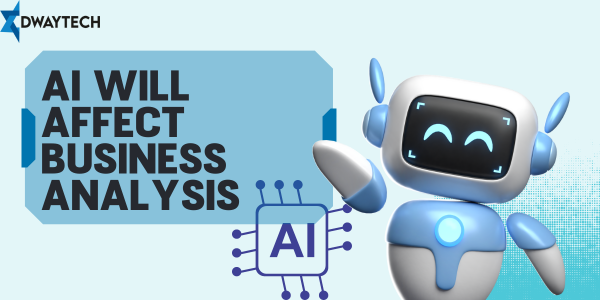How AI Will Affect Business Analysis – Integrating Artificial Intelligence (AI) into business analysis is no longer a distant dream but a burgeoning reality transforming the landscape. As we step into 2024, AI’s impact on business analysis is set to be profound, driving efficiencies, uncovering insights, and shaping strategic decision-making.
This article explores how AI will influence business analysis in the coming year, highlighting its benefits, challenges, and future trends.
Enhanced Data Processing and Analysis
One of the most significant impacts of AI on business analysis is its ability to process and analyze vast amounts of data at unprecedented speeds. Traditional data analysis methods often struggle with modern data’s volume, variety, and velocity. AI-powered tools, however, can swiftly sift through big data, identify patterns, and provide actionable insights. This capability allows businesses to make data-driven decisions faster and with greater accuracy.
Predictive Analytics
AI’s predictive analytics capabilities are revolutionizing how businesses forecast future trends. By leveraging machine learning algorithms, AI can analyze historical data to predict future outcomes. This ability is invaluable for business analysts anticipating market shifts, consumer behavior, and financial trends. In 2024, predictive analytics will become even more sophisticated, enabling businesses to stay ahead of the curve and make proactive decisions.
Automation of Routine Tasks
Business analysts often spend significant time on routine tasks such as data entry, reporting, and basic analysis. AI can automate these tasks, allowing analysts to focus on more strategic activities. Robotic Process Automation (RPA) combined with AI can handle repetitive tasks precisely, reducing human error and increasing efficiency. This shift allows business analysts to concentrate on interpreting data and providing deeper insights.
Improved Decision-Making
AI-driven tools enhance decision-making processes by providing real-time insights and recommendations. With AI, business analysts can access advanced analytics that better understand data correlations and causal relationships. This insight enables more informed decision-making, helping businesses optimize operations, improve customer experiences, and increase profitability. AI’s ability to simulate various scenarios and outcomes also supports strategic planning and risk management.
Personalization and Customer Insights
Understanding customer behavior is crucial for any business. AI can analyze customer data to provide personalized experiences and targeted marketing strategies. In 2024, AI will further refine its ability to segment customers, predict preferences, and suggest personalized solutions. This level of personalization not only enhances customer satisfaction but also drives loyalty and sales growth.
Real-Time Analytics
The demand for real-time data and insights is growing, and AI is at the forefront of meeting this demand. AI-powered analytics platforms can process real-time data, providing businesses with up-to-the-minute insights. This capability is precious in dynamic retail, finance, and technology industries, where timely information is critical for making swift decisions. Real-time analytics also support more responsive and agile business operations.
Ethical and Responsible AI Use
As AI becomes more integrated into business analysis, ethical considerations will take center stage. Issues such as data privacy, bias in AI algorithms, and transparency in AI-driven decisions are critical. In 2024, businesses will need to focus on implementing ethical AI practices to build trust with stakeholders and ensure compliance with regulations. Responsible AI use involves rigorous testing, monitoring, and governance to mitigate risks and uphold ethical standards.
Challenges and Considerations
While the benefits of AI in business analysis are substantial, several challenges must be addressed. Data quality and accessibility remain significant hurdles. AI systems are only as good as the data they analyze, so ensuring high-quality, clean data is essential. Additionally, integrating AI into existing business processes requires investment in technology and skills development. Businesses must also navigate the complexities of AI implementation, from selecting the right tools to managing change within the organization.
Future Trends in AI for Business Analysis
Looking ahead, several trends are expected to shape the future of AI in business analysis:
- Augmented Analytics: Combining AI with human intelligence to provide enhanced insights and decision-making support.
- Natural Language Processing (NLP): Improved NLP capabilities will allow AI to understand and generate human language more effectively, aiding in data interpretation and communication.
- Explainable AI: As transparency becomes more important, explainable AI will help businesses understand how AI algorithms arrive at specific conclusions, fostering trust and accountability.
- AI-Driven Strategy: AI will increasingly be used to formulate and optimize business strategies, moving from operational support to strategic leadership roles.
Conclusion
AI is poised to revolutionize business analysis in 2024, offering unprecedented capabilities in data processing, predictive analytics, automation, and decision-making. Although there are difficulties, they are greatly outweighed by the possible advantages. By embracing AI, businesses can gain a competitive edge, drive innovation, and achieve greater operational efficiencies. As AI technology continues to evolve, its role in business analysis will only become more integral, shaping the future of business intelligence and strategy.
Frequently Asked Questions (FAQs)
Q1: How will AI improve data processing and analysis for business analysts in 2024?
A: AI will significantly enhance data processing and analysis by swiftly sifting through vast amounts of data, identifying patterns, and providing actionable insights. This capability allows business analysts to make data-driven decisions faster and with greater accuracy, overcoming the limitations of traditional data analysis methods.
Q2: What role will predictive analytics play in business analysis with AI integration?
A: Predictive analytics, powered by AI, will revolutionize business forecasting by analyzing historical data to predict future outcomes. This enables business analysts to anticipate market shifts, consumer behavior, and financial trends with greater accuracy, allowing for proactive decision-making and strategic planning.
Q3: How can AI automate routine tasks for business analysts?
A: AI can automate routine tasks such as data entry, reporting, and basic analysis through Robotic Process Automation (RPA). This automation reduces human error, increases efficiency, and frees up business analysts to focus on more strategic activities, such as interpreting data and providing deeper insights.
Q4: What ethical considerations should businesses keep in mind when integrating AI into business analysis?
A: Businesses need to focus on ethical AI practices, addressing issues like data privacy, bias in AI algorithms, and transparency in AI-driven decisions. Implementing responsible AI use involves rigorous testing, monitoring, and governance to mitigate risks and uphold ethical standards, thereby building trust with stakeholders and ensuring compliance with regulations.
Q5: What future trends in AI for business analysis should businesses prepare for?
A: Several future trends will shape AI in business analysis, including:
- Augmented Analytics: Combining AI with human intelligence for enhanced insights and decision-making support.
- Natural Language Processing (NLP): Improved NLP capabilities for better data interpretation and communication.
- Explainable AI: Providing transparency in AI algorithms to foster trust and accountability.
- AI-Driven Strategy: Using AI to formulate and optimize business strategies, moving beyond operational support to strategic leadership roles.
Also, useful Links:
Business Analyst Training Course Online Request Demo











